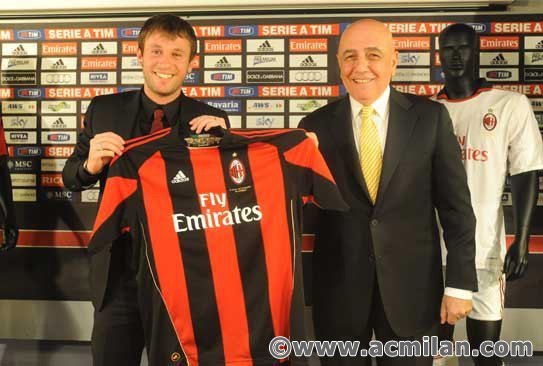 |
| Courtesy of www.acmilan.com |
It is impossible to overestimate the importance of Pazzini and Cassano to last year's Sampdoria side. The two strikers formed the fulcrum of the team, almost leading them to the Champions League by finishing fourth in Serie A last season.
In Cassano, Sampdoria had a creative talent, a mercurial player who could create chances out of nothing, who could severe a defence with a single piece of skill or a pass. Some even considered him the best Italian player last season, especially as the Cassano-less Italy squad finished last in their World Cup group which featured the likes of Slovakia and New Zealand; believed to be easy pickings for the reigning Champions.
While Cassano played in a withdrawn role to the left of the Sampdoria attack, his forward partner, Pazzini, played as a natural goalscorer. Cassano created chances. Pazzini took them. A player with great finishing abilities, Pazzini was also clever in his positioning to create himself the best scoring opportunities.
With these two players, Sampdoria looked again like the 1991 Scudetto-winning side, banishing the memories of Gianluca Vialli and Paolo Mancini away. Sampdoria were finally good again. Finishing fourth was a cause for major celebrations in one half of Genoa. This footballing Renaissance didn't last forever and the beginning of the end of it started at an awards ceremony.
At the awards ceremony in October, Sampdoria chairman Riccardo Garrone apparently invited Cassano to come and speak for an award he was about to receive. Cassano refused, saying he had other commitments. Later, Garrone asked Cassano at the training ground dressing rooms on why he had refused to come to the awards ceremony, as it had embarassed him to give an award to player who wasn't there and seemingly didn't care about the award. Cassano, who after making his name as the food crazed love-rat at Roma, started swearing at him, according to Garrone, calling him a 'fat s**t' among other profanities. Cassano denies these allegations, but Garrone stayed unmoved and appealed to the Italian court of justice to have Cassano's contract rescinded, which was eventually rescinded from January 2011 onwards with Sampdoria having to pay 50% of the rest of his contract. A free agent, Cassano moved to Milan to join up and form a strike patnership with other controversial players, Zlatan Ibrahimović, Robinho and Alexandre Pato.
With Cassano gone, Pazzini also left, joining Inter for a reported £15 million and Jonathan Biabiny. On his debut for the Nerazzurri, Pazzini came on as a substitute at halftime with Inter losing 2-0 and subsequently scored two goals and scored a penalty which Samuel Eto'o dispatched for the Inter comeback.
The loss of Cassano and Pazzini has left Sampdoria considerably short of fire power this calendar year. In their last six games, Sampdoria have only gained one point (a 0-0 draw with Juventus) and have scored no goals. Nothing. And its not suprising. Sampdoria now have to rely on Maccarone, who for all his substitute heroics for Middlesbrough isn't a regular goalscorer, and Federico Macheda, who has only scored four goals in his proffesional career. Sampdoria have now slipped to 14th place, a shadow of the team they once were.
Now would usually come the natural end of this article. But it isn't over. Because Sampdoria have something rare which other Italian teams don't possess. A talented youth section. With Vladimir Koman and Andrea Poli Sampdoria have their midfield sorted for the next few years, with the former providing a powerful engine and the former a long term replacement for team stalwart Angelo Palombo. Furthermore, the Pazzini sale brought Jonathan Biabiny, a French winger with electric pace and a player who feautured for the Inter team regularly this season. Sampdoria also traditionally have been a team which take risks. This can be a bad thing, but since many Italian have been reluctant to play youngsters or vary their formations (it is a proffession in Italy, not just a game as we see it) Sampdoria can set themselves away from the crowd and provide something different. And they might just be successful! But don't count on them winning anything for the time being.


